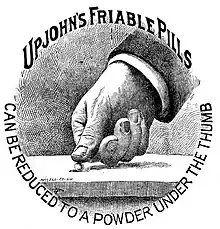Upjohn
The Upjohn Company was a pharmaceutical manufacturing firm founded in 1886 in Hastings, Michigan, by Dr. William E. Upjohn who was an 1875 graduate of the University of Michigan medical school. The company was originally formed to make friable pills, which were specifically designed to be easily digested.[1] They could be "reduced to a powder under the thumb", a strong marketing argument at the time.
 | |
| Industry | Pharmaceutical |
|---|---|
| Founded | 1886 |
| Defunct | 1995 |
| Fate | Merged with Pharmacia to form Pharmacia & Upjohn |
| Successor | Pharmacia & Upjohn Viatris |
| Headquarters | Michigan, United States |

History

Upjohn developed a process for the large scale production of cortisone. The oxygen atom at the 11 position in this steroid is an absolute requirement for biological activity. There are however no known natural sources for starting materials that contain that feature. The only method for preparing this drug prior to 1952 was a lengthy synthesis starting from cholic acid isolated from bile. In 1952, two Upjohn biochemists, Dury Peterson and Herb Murray announced that they were able to introduce this crucial oxygen atom by fermentation of the steroid progesterone with a common mold of the genus Rhizopus. Over the next several years a group of chemists headed by John Hogg developed a process for preparing cortisone from the soybean sterol stigmasterol. The microbiological oxygenation is a key step in this process.[2]
Subsequently, Upjohn together with Schering biochemically converted cortisone into the more potent steroid prednisone by a bacterial fermentation.[3][4] In chemical research, the company is known for the development of the Upjohn dihydroxylation by V. VanRheenen, R. C. Kelly, and D. Y. Cha in 1976.[5] Upjohn's best known drugs before the acquisition by Pfizer were Xanax, Halcion, Motrin, Lincocin, and Rogaine.
In 1995, Upjohn merged with Pharmacia AB to form Pharmacia & Upjohn;[6] the company was owned by Pfizer from 2002 until 2020.
In 2015, Pfizer resurrected the Upjohn name for a division which manufactures and licenses drugs for which patents have expired; as of 2019, it planned to divest itself of this business in 2020.[7]
In July 2019, Pfizer announced plans to merge Upjohn with Mylan.[8] The merger was expected to close in the first half of 2020, but was delayed due to the COVID-19 pandemic.[9] The merger was completed in November 2020 and the new company was named Viatris.[10]
References
- Lohrstorfer, Martha; Larson, Catherine (2002). "William E. Upjohn: Person of the Century 1853 - 1932". Kalamazoo Public Library. Archived from the original on September 28, 2007.
{{cite web}}: CS1 maint: unfit URL (link) - Hogg, John A. (1992). "Steroids, the steroid community, and Upjohn in perspective: A profile of innovation". Steroids. 57 (12): 593–616. doi:10.1016/0039-128X(92)90013-Y. PMID 1481225. S2CID 21779154.
- "Prednisone Half Life Is A Good Medicine". PrednisoneSideEffects.org. Archived from the original on January 11, 2012.
{{cite web}}: CS1 maint: unfit URL (link) - "DailyMed - DELTASONE- prednisone tablet". dailymed.nlm.nih.gov.
- Vanrheenen, V.; Kelly, R.C.; Cha, D.Y. (1976). "An improved catalytic OsO4 oxidation of olefins to cis-1,2-glycols using tertiary amine oxides as the oxidant". Tetrahedron Letters. 17 (23): 1973–6. doi:10.1016/S0040-4039(00)78093-2.)
- "Upjohn Company". Resource Informagen. Archived from the original on May 7, 2006.
{{cite web}}: CS1 maint: unfit URL (link) - Nathan-Kazis, Josh (September 19, 2019). "Pfizer Is Spinning Off Upjohn. What's Left Will Be No Bargain, Analyst Says". Barron's. Retrieved March 30, 2020.
- Valinsky, Jordan (29 July 2019). "Viagra and EpiPen drugmakers form a $20-billion-a-year powerhouse". CNN. Retrieved 2020-05-07.
- Gough, Paul (26 March 2020). "Mylan delays merger with Upjohn due to COVID-19 pandemic". Pittsburgh Business Times.
- Sabatini, Patricia (16 November 2020). "Mylan completes merger with Upjohn to form Viatris". Pittsburgh Post-Gazette. Retrieved 2020-11-18.
- Upjohn Co. v. United States (449 U.S. 383) (1981)